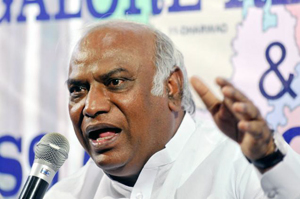Bengaluru, March 27:Senior Congress leader and former Union Minister Mallikarjun Kharge and Chief Minister Siddaramaiah have never seen eye-to-eye.
The Kharge camp has always felt that it was Siddaramaiah who came in the way of their leader from becoming the chief minister of the state in 2013. There has been a buzz in the State Congress that Kharge will replace Siddaramaiah before the 2018 Assembly polls.
So on Saturday when Kharge called on Siddaramaiah at the latter’s home office it raised eyebrows in the Congress camp and also speculation in the opposition BJP.
The two were closeted together for an hour. Speaking to reporters after the meeting, Kharge said he had discussed pending projects in Hyderabad-Karnataka region including the Wadi-Gadag railway line, Narayanapur Right Bank Canal, industrial zones, among others, with the chief minister.
To a query on the setting up of the Anti-Corruption Bureau (ACB), for which Siddaramaiah had come at the receiving end from various quarters, Kharge was all support to the chief minister.
He said, “The concept is not confined to Karnataka but exists in 15 states including several BJP?ruled states.... The government has clarified that the powers of the Lokayukta have not being curtailed. There is no need for any controversy or confusion.” He also said the Congress high command had not taken exception to the decision to constitute the ACB.
On Congress leaders including S M?Krishna, Janardhana Poojary opposing the setting up of the ACB, Kharge said, “I have placed my views from what knowledge I have.... We have to trust the chief minister.... If somebody does not want to trust, it is up to them.” He said if some Congress legislators have concerns regarding the move to set up the ACB, they can raise it in the legislature party meeting.
The BJP had its own interpretation regarding the new found bonhomie between the two leaders. BJP MLC?G?Madhusudhan said Kharge had met Siddaramaiah to impress upon him not to table the Karnataka Minority Commission report on encroachment of wakf property in the Legislative Council.
“Kharge’s name is there in the list and he wants Siddaramaiah to save him. We want to save wakf property,” he said.





Comments
Add new comment